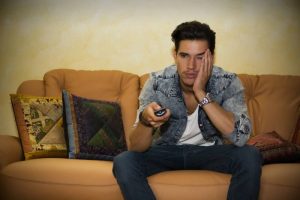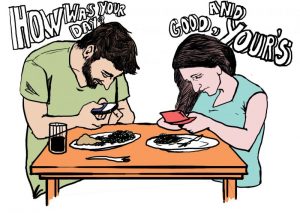The Power of Television as a Social Surrogate: An Interview with Jaye L. Derrick, Ph.D.

Jaye L. Derrick, Ph.D., is an assistant professor of Social Psychology and director of Social Processes Laboratory at the University of Houston. She investigates the influence of close relationships (and faux relationships) on self-regulation, well-being, health, health behaviors, and addictive behaviors; the influence of substance use on close relationship functioning and intimate partner aggression; daily diary and EMA research methods.

How did you first become interested in psychology?
I became interested in psychology as a teenager in high school. I was involved in a senior honors class that guided us through an independent research project about a potential career path. At that time, I was very interested in helping children and adolescents who were experiencing depression. I didn’t become interested in social psychology until my senior year of college, when I worked with two social psychologists who studied close relationships.
You specialize on the influence of close relationships (and faux relationships) on self-regulation, well-being, and health. I am wondering if you can touch a bit on what the research is for our audience who may be learning about you for the first time.
We often think of people working toward goals, like studying or losing weight, in isolation. However, people are incredibly social, and most of their behavior is influenced by those around them. For example, people involved in romantic relationships are strongly influenced by their partner, especially when they live together and spend a great deal of time near each other. When they have a lot of fights or even just frustrating interactions, it might be harder for both partners to work toward their goals. When they get along well, or particularly when they make each other feel energized, they can help each other work toward their goals. Most of my research has focused on how partners influence smoking cessation and risky alcohol use.

One concept that I found particularly interesting in your research was that of social surrogacy. Can you tell us more about that?
As I mentioned previously, people are very social. Unfortunately, we can’t always get all the social interaction we want when we want it. When people are feeling lonely, or if they’ve just had a fight with a close other, they often turn to fictional or non-human targets to fill that need to belong. We have studied how people can, at least temporarily, feel connected to television, movie, or book characters (or celebrities). We have also found that these faux relationships, or “social surrogates,” can increase people’s energy and ability to self-regulate, help them quit smoking, and lead them to drink less.
With the changing way in which the majority of people, especially young people, watch TV now through streaming services and “binge-watching,” how do you think this will change the way in which people use TV as a social surrogate and form these faux relationships, if at all?
When studying social surrogacy, we discovered that people received benefits (to belonging, self-regulation, etc.) only when considering favorite television programs, movies, and books – not when considering new shows, movies, or book, or when considering watching whatever is on television. To the extent that people use binge watching to view a favorite program, and do this instead of “channel surfing,” there may actually be benefits to the ability to binge watch. A favorite program is always available. Binge-watching could become problematic to the extent that people are watching shows that they don’t really care for, or perhaps to the extent that they’re engaging in these activities to the exclusion of “real” social interaction. In the past, however, there hasn’t been much evidence that people actually do this. Chronically lonely people, for example, don’t watch more television than their non-lonely counterparts. Sometimes we even find evidence that they watch less! Instead, they seem to miss the social benefits that other people are able to derive from narratives.

How do you think this use of media as social surrogate extends to social media with apps like SnapChat, Instragram (live), Facebook (live), Periscope, etc., where people can livestream their own lives?
We have been interested in Facebook (and other social media platforms) largely for the ability to “lurk” or read posts without posting. In our opinion, doing so shows that people are searching for reminders of social connection without actively engaging. To the extent that people are posting, they are actively seeking engagement with others, and therefore, we see that as a different type of behavior.
How do you think these faux relationships affect real relationships in people’s lives?
There is some evidence that people benefit from watching and discussing (and reliving?) the same television shows with their friends. You might call it the “water cooler” effect. We think that knowing you are part of a group of people who all watch the same show is in itself a way of increasing feelings of social connection. There is also some evidence that couples watching shows together feel like they are engaging with their circle of friends – i.e., these relationships become “couple friends” rather than an individual’s friends.
How can people maintain a good and healthy balance between these two types of relationships?
It’s always important to spend some time face-to-face with your close others. Relationships diminish if you don’t put the time and effort into them. Reading status updates does not manage this deeper relationship. Watching television next to someone is not a substitute for social interaction. However, technologies can make a nice supplement for other types of interactions. If you already have a strong relationship, supplementing face-to-face interaction with reading status updates would only keep you close. Watching a favorite show with someone that you also discuss other important topics with is a great way to enjoy leisure time.

Any new projects that you can share with our readers?
I already kind of alluded to some – we are studying how social surrogates can influence smoking and alcohol use, which is a newer area for us. We are also working on a project showing that social surrogates can actually make people more prosocial. So even though we think of television shows making people more aggressive and antisocial, this doesn’t appear to be the case for favorite programs. Instead, they seem to make people more agreeable and trusting, and make them more willing to do prosocial things like sacrifice for their romantic partner or help an experimenter with a second study for no compensation.
Thank you, Dr. Derrick!



Responses